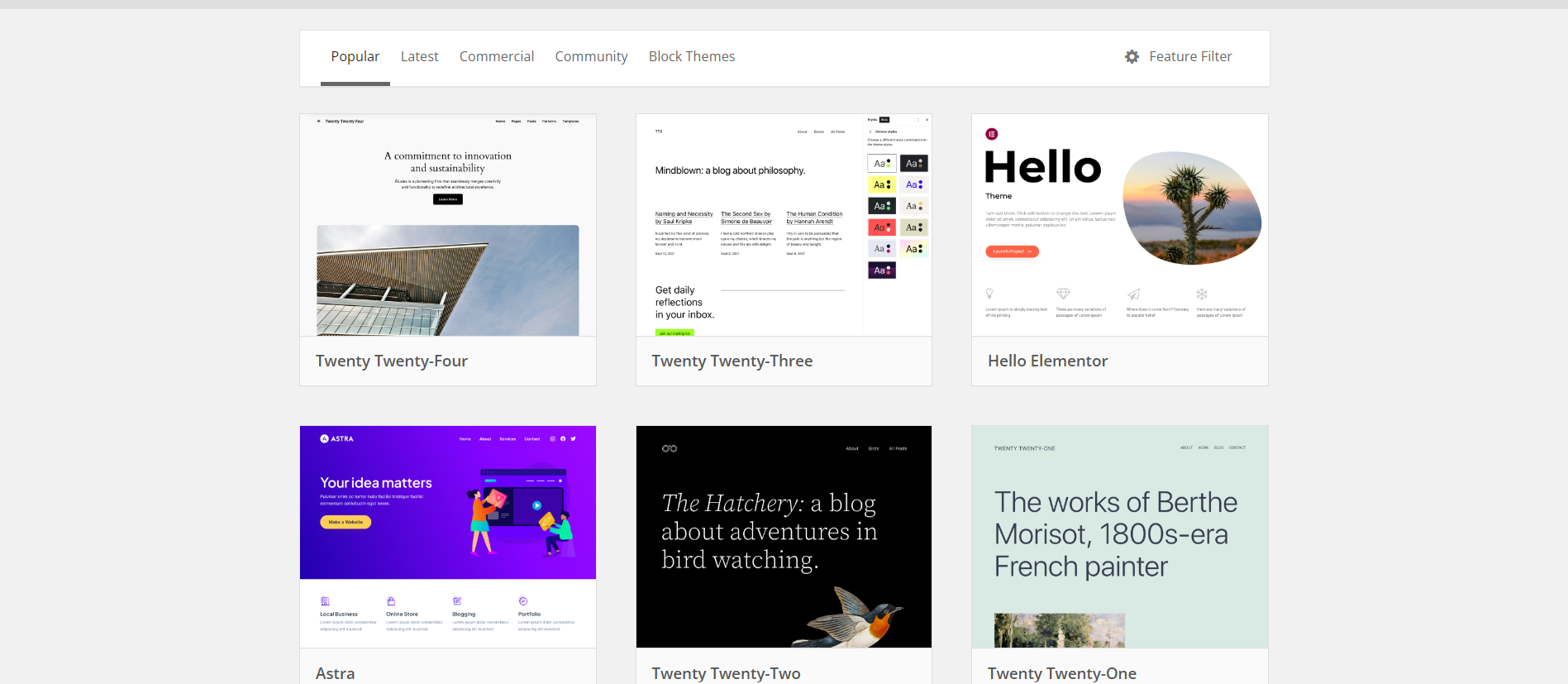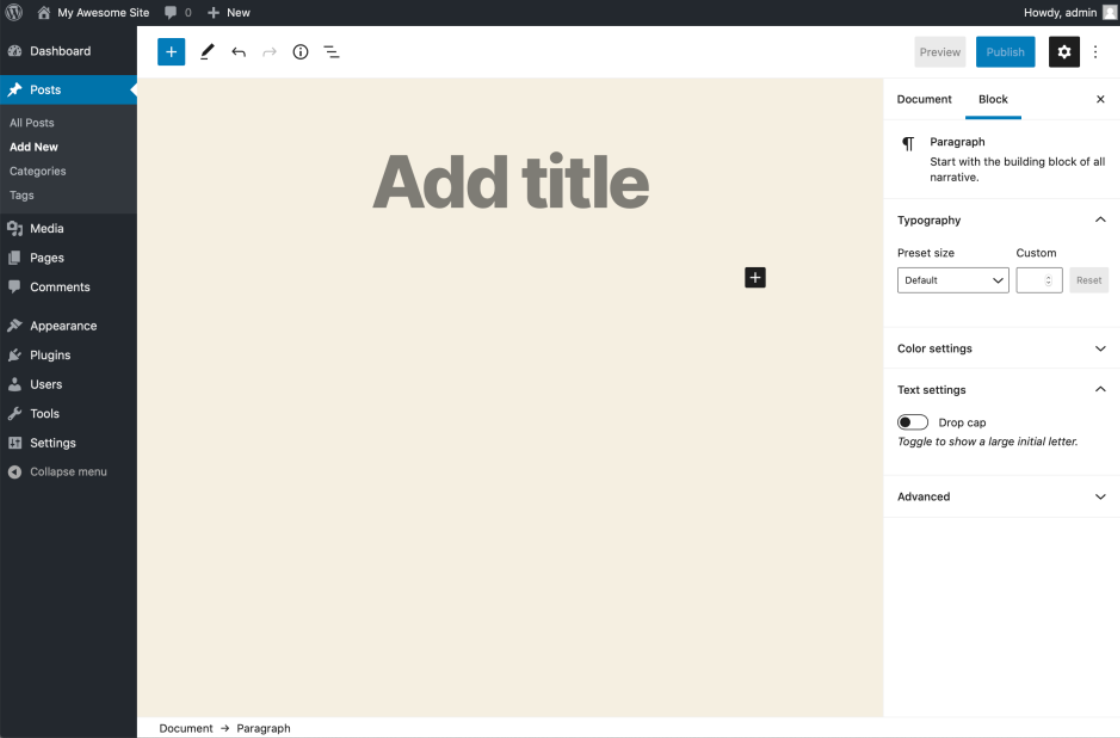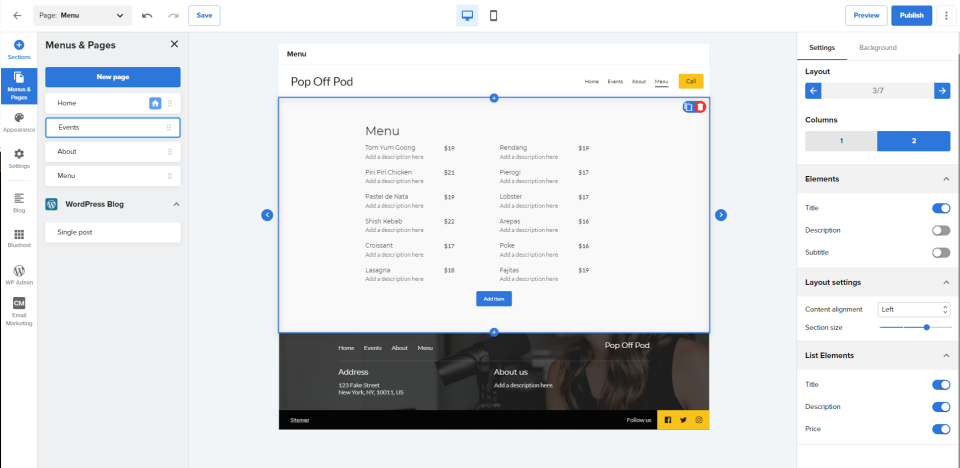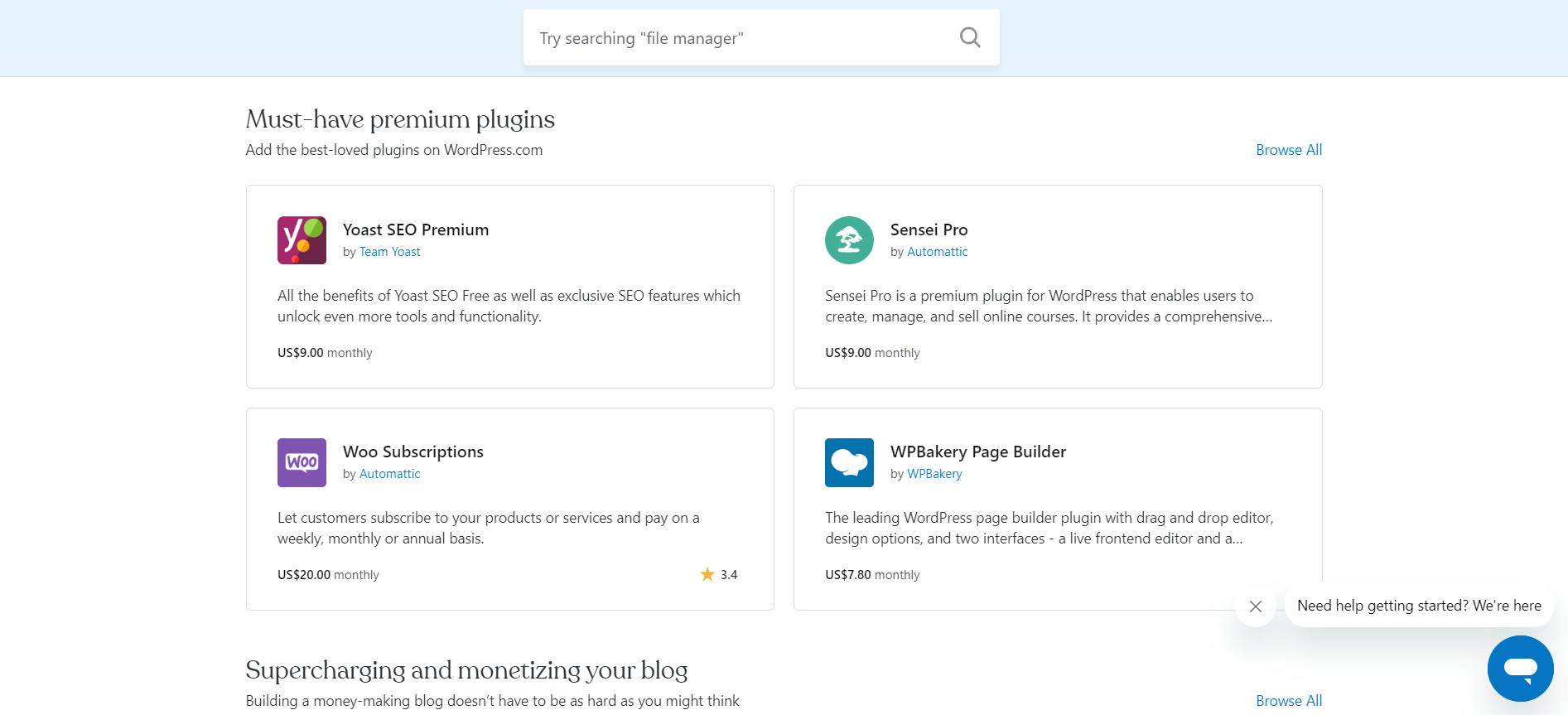WordPress vs BlueHost: Final verdict
WordPress and BlueHost both offer robust platforms, but they cater to different user needs and preferences.
-
WordPress (Overall Grade: 7.1/10)
is an open-source content management system that excels in customization and flexibility. It is ideal for users who want extensive control over their website’s design and functionality. With a vast array of themes and plugins, WordPress is suitable for blogs, business sites, and online stores. However, it has a steeper learning curve and requires separate hosting and domain services. When comparing WordPress vs BlueHost, WordPress stands out for its extensive customization options and strong community support. -
BlueHost (Overall Grade: 6.8/10)
is a comprehensive web hosting service that includes a user-friendly website builder. It integrates seamlessly with WordPress, offering a range of customization options and access to thousands of themes and plugins. BlueHost is designed for users who prefer an all-in-one solution with easy setup and management. It provides various hosting plans, making it versatile for different needs. In the WordPress vs BlueHost comparison, BlueHost is more accessible for beginners and offers better customer support and security features.

|

|
|
|---|---|---|
|
Design functionalities & templates |
9.0 |
7.2 |
|
Ease of use |
7.2 |
8.2 |
|
Ecommerce |
8.4 |
6.8 |
|
Website Editors |
8.5 |
7.3 |
|
Product testing options |
8.1 |
6.2 |
|
Price |
5.9 |
7.2 |
|
Hosting quality |
0 |
8.0 |
|
Website speed optimization |
6.5 |
6.5 |
|
Plugins/extensions and integrations |
8.8 |
9.1 |
|
Marketing features |
8.0 |
7.3 |
|
Customer support |
5.0 |
7.6 |
|
Website security |
6.7 |
8.3 |
|
AI capabilities |
6.1 |
1.5 |
|
User Management |
8.8 |
4.4 |
Which one is the best for ecommerce: WordPress or BlueHost?
 8.4
8.4
 6.8
6.8
Verdict
: BlueHost is a solid choice for those seeking an integrated hosting and website building solution, but WordPress excels with its extensive customization options and robust ecommerce capabilities.
-
WordPress
: With its open-source nature and extensive plugin ecosystem, WordPress is highly customizable and ideal for ecommerce. It supports WooCommerce, multiple payment gateways, and offers advanced analytics and SEO tools. When comparing WordPress vs BlueHost, WordPress stands out for its flexibility and depth in ecommerce features. -
BlueHost
: While primarily a web hosting service, BlueHost offers a user-friendly website builder with ecommerce features, including WooCommerce integration. It provides essential ecommerce functionalities like product listings, secure payment gateways, and inventory management. However, it may have a steeper learning curve for those unfamiliar with WordPress and WooCommerce.
Which one is the best for informational and business websites?
 9.2
9.2
 7.5
7.5
Verdict
: When it comes to creating informational and business websites, WordPress stands out as the superior choice due to its extensive customization options and robust support network. BlueHost, while versatile and user-friendly, is better suited for users who prioritize ease of use and integrated hosting solutions.
-
WordPress
: WordPress excels in providing a highly customizable platform with a vast array of themes and plugins, making it ideal for creating diverse types of informational and business websites. Its open-source nature allows for extensive creative control, appealing to users who want to tailor their sites to specific needs. With a score of 9.2, WordPress is particularly strong in design functionalities and learning resources, offering detailed documentation and community support to help users build and manage their websites effectively. -
BlueHost
: BlueHost offers a user-friendly website builder that integrates seamlessly with WordPress, providing access to thousands of themes and plugins. It is designed to help users create professional-looking websites with ease, featuring a drag-and-drop interface that is accessible even to those with little to no coding experience. With a score of 7.5, BlueHost is a solid choice for users who prioritize ease of use and integrated hosting solutions, making it a versatile option for a broad audience. However, it may not offer the same level of customization and creative freedom as WordPress.
WordPress vs BlueHost: Detailed comparison
Design functionalities & templates
Design FunctionalitiesRepresents how well each platform allows for creative design and customization of websites.Score Components:
- Template Variety (30%): Range and quality of design templates.
- Customization (30%): Flexibility and options for design alterations.
- User Interface (20%): Ease and intuitiveness of the design process.
- Responsiveness (10%): Adaptability to different devices and screen sizes.
- Innovation (10%): Unique design features and tools.
 9.0
9.0
 7.2
7.2
🏆
Winner: WordPress.
If you’re looking for a platform that offers more creative control and a wide array of design features, WordPress is the preferred choice.
WordPress offers an extensive variety of templates and designs, catering to a wide range of website types beyond just blogs or ecommerce. Its open-source nature allows for high customization and creative freedom, appealing to diverse user needs.


Compared to WordPress, BlueHost’s WordPress website builder offers over 300 pre-installed templates and designs to cater to the diverse needs of its users, ensuring that there’s something for everyone, regardless of the niche or industry.

Get a head start on website creation with AI
Create a custom website tailored to your business needs 10X faster with 10Web AI Website Builder!
Ease of use
Ease of useReflects the platform’s overall user-friendliness.Score
Components:
- Learning curve (40%): Quickness and ease of getting started.
- Interface design (30%): Simplicity and intuitiveness of layout.
- User guidance (20%): Quality of tutorials and support.
- Flexibility (10%): Adaptability to various user skills.
 7.2
7.2
 8.2
8.2
🏆 Winner: BlueHost
. With a score of 8.2, BlueHost’s user-friendly interface and drag-and-drop design make it a more accessible option for beginners compared to WordPress, which scored 7.2 and is known for its steeper learning curve. If ease of use is a priority, BlueHost is the clear winner in this category.
Learning Resources
🏆 Winner: WordPress
. Both platforms offer solid learning resources, but WordPress stands out with its vast array of detailed documentation, community forums, online tutorials, and courses. This extensive support network is beneficial for users of all skill levels.
For ecommerce
EcommerceMeasures the platform’s effectiveness in supporting online business activities.Score Components:
- Ecommerce themes and templates (20%): Variety and design of templates.
- Product management (25%): Ease of managing and organizing products.
- Payment options (25%): Variety and convenience of payment methods.
- Ecommerce features (20%): Features for managing an ecommerce store.
- Integration (10%): Compatibility with external e-commerce tools and services.
 8.4
8.4
 6.8
6.8
WordPress, with its open-source nature, offers extensive customization options for ecommerce through plugins like WooCommerce. BlueHost, while primarily a web hosting service, also provides a website builder with ecommerce features, including WooCommerce integration for WordPress sites. However, BlueHost may have a steeper learning curve for those unfamiliar with WordPress and WooCommerce.

|

|
|
|---|---|---|
|
Ecommerce themes and templates |
9.2 |
6.5 |
|
Product page customization |
9.0 |
7.0 |
|
Payment processing and commissions |
7.5 |
6.8 |
|
POS capabilities |
6.5 |
0.0 |
|
Payment gateways |
8.5 |
7.5 |
|
Product numbers |
7.0 |
6.0 |
|
Additional ecommerce features |
8.0 |
6.5 |
WordPress ecommerce features:
- WooCommerce Integration
- Multiple Payment Gateway Support
- Abandoned Cart Recovery
- Ecommerce Analytics
- SEO Optimization Tools
- Extensive Plugin Ecosystem
BlueHost ecommerce features:
- Product Listings
- Shopping Carts
- Secure Payment gateways
- Shipping Options and Tax Calculations
- Inventory Management
Ecommerce themes & templates
WordPress offers hundreds to potentially thousands of ecommerce and WooCommerce specific themes and templates, both free and premium. BlueHost’s website builder for ecommerce provides a selection of specific templates designed to streamline the creation of online stores. These templates are optimized for sales, featuring designs that accommodate product galleries, shopping carts, and checkout processes. However, the customization options might be limited compared to more specialized ecommerce platforms.
Product page customization
WooCommerce on WordPress offers extensive customization for ecommerce product pages, balancing plugins, page builders, and custom coding. Advanced features like product tabs, upsells, and related products are customizable. Tools like Elementor and the Ultimate Product Catalog plugin enhance functionality, but heavy plugin use may affect site performance. BlueHost’s website builder offers robust customization features for product pages, allowing users to tailor product details like titles, descriptions, images, and pricing according to their preferences.
Payment processing
WordPress doesn’t handle payments directly but offers plugin options for payment processing. Popular gateways include PayPal, Stripe, Authorize.Net, and Square. BlueHost doesn’t directly support numerous payment gateways. However, it does integrate with WooCommerce, a platform that facilitates integration with various payment gateways like PayPal and Stripe. While BlueHost doesn’t impose transaction fees, the payment gateways might.
Considering the features, availability, cost, and flexibility, WordPress appears to be a more robust and flexible ecommerce solution compared to BlueHost. However, if you are looking for a more budget-friendly option with some free extras, BlueHost might still be worth considering.
Website Editors
Website EditorsEvaluates the platforms’ website building and editing capabilities.Score Components:
- Customization tools (40%): Range and power of editing features.
- Editor usability (30%): User experience within the editor.
- Design flexibility (20%): Freedom in layout and design changes.
- Update and maintenance ease (10%): Simplicity of updating and maintaining the site.
 8.5
8.5
 7.3
7.3
🏆
Winner: WordPress
. WordPress, with a score of 8.5, offers a user-friendly interface with block-based editing, extensive styles customization, template management, page editing/creation, distraction-free modes, versatile saving options, and accessibility for users of varying skill levels. It also provides a WYSIWYG (What You See Is What You Get) interface, allowing users to see the end result while editing the website.

BlueHost’s website builder editor, scoring 7.3, is designed for ease of use, catering to both beginners and advanced users. It offers a section based drag-and-drop interface, allowing users to easily add, remove, and customize elements on their website without needing to code. However, some users might find the variety of options and settings overwhelming at first.

Mobile editor/app
 8.1
8.1
 5.0
5.0
🏆
Winner: WordPress
. Both WordPress and BlueHost offer mobile editing capabilities, but they cater to different needs and skill levels. WordPress has a dedicated mobile app that allows users to manage their website on the go, including creating and editing posts, managing comments, scheduling content, and analyzing website traffic. However, it has some limitations compared to the web-based editor, including fewer advanced options, restricted code access, and limited design customization.
BlueHost, on the other hand, does not have a dedicated mobile editor app. Users can edit their website on a mobile browser, but this comes with some limitations.
In summary, WordPress receives a higher rating due to its dedicated mobile app and the range of features it offers, while BlueHost’s mobile editing capabilities are more limited.
Product testing options
Product Testing OptionsAssesses the options for trying out platform features before commitment.Score Components:
- Trial quality (40%): Extent and usefulness of the trial or free version.
- Feature accessibility (30%): How many features are available to test.
- Trial duration (20%): Length of the trial period.
- Ease of transition (10%): Smoothness of moving from trial to paid plans.
 8.1
8.1
 6.2
6.2
Overall Result
: WordPress scores higher with 8.1 compared to BlueHost’s 6.2. WordPress, being an open-source CMS, is free to use and offers extensive customization options. However, it does not provide a trial version or the possibility to test premium features. On the other hand, BlueHost does not offer a free or trial version, but it allows testing of premium features within a 30-day refundable period and offers a 30-day money-back guarantee.

|

|
|
|---|---|---|
|
Free Plan |
Yes (open source software) |
No |
|
Trial Duration |
No | No |
|
Testing Premium Features |
No |
Yes, within 30-day refundable period |
Price
PriceLooks at the cost-effectiveness and value for money of each platform.Score Components:
- Plan value (40%): What each pricing tier offers.
- Transparency and clarity (30%): Clearness of pricing structures.
- Flexibility of plans (20%): Range of options to suit different budgets.
- Hidden costs (10%): Additional expenses not included in the plan.
 5.9
5.9
 7.2
7.2
BlueHost offers a range of pricing plans with different features, while WordPress is a free open-source platform, but requires separate hosting and domain services.

|

|
|
|---|---|---|
|
Free |
Free Plan ($0/month): WordPress is open source software that is free. WordPress does not provide hosting services; so, it is necessary to purchase a domain, web hosting, and website builder subscriptions separately. While WordPress lacks built-in ecommerce, plugins like WooCommerce offer a solution. WordPress offers an extensive variety of templates and designs. WordPress lacks a built-in AI-assisted builder, but its open-source nature allows for an ecosystem of plugins and themes incorporating AI for website building. |
No offering at this amount. |
|
$10-$20 |
No offering at this amount. |
Basic ($15.99/month): Made for a simple website or blog, 1 website with 10GB SSD storage, Free CDN, Free Domain 1st year, Managed WordPress Hosting, Free SSL 1st year and Chat Support Value for price: 6.5 |
|
$20-$30 |
No offering at this amount. |
Choice Plus ($27.99/month): Ideal for multiple sites needing storage, security, backups, 3 websites with 40GB SSD storage, Free CDN, Free Domain 1st year, Managed WordPress hosting, Free SSL, Free Domain privacy 1st year, Malware scanning, daily site backups are free for the 1st year with the purchase of a 12 or 36-month package. Otherwise, users are required to pay a one-time fee of $35.88 for backup services. Value for price: 7.5 |
|
$30-$35 |
No offering at this amount. |
Online Store ($32.99/month): Great for all online selling, built-in eCommerce tools, 3 websites with 40GB SSD storage, Free CDN, Free Domain 1st year, Managed WordPress hosting, Free Domain privacy 1st year, Malware Scanning, Exclusive Theme Store, Store Analytics, Unlimited products, Secure Payment options, Bookings & appointments, Shipping labels, product search and filtering, daily site backups are free for the 1st year with the purchase of a 12 or 36-month package. Otherwise, users are required to pay a one-time fee of $35.88 for backup services. Value for price: 8.5 |
|
$35+ |
No offering at this amount. |
Pro ($39.95/month): Perfect for high traffic, advanced storage, security, 5 websites with 100GB SSD storage, Free CDN, Free Domain 1st year, Managed WordPress hosting, Free SSL, Free Domain privacy 1st year, Malware Scanning, daily site backups are free for the 1st year with the purchase of a 12 or 36-month package. Otherwise, users are required to pay a one-time fee of $35.88 for backup services. Value for Price: 9.0 |
location. As a result in rare cases the prices displayed here can differ from the ones you see on their
websites.
Hosting quality
Hosting
qualityExamines the reliability and performance of the hosting solutions.Score Components:
- Uptime (40%): Consistency and reliability of website availability.
- Speed (30%): Loading times and performance.
- Bandwidth and storage (20%): Sufficiency of resources provided.
- Data centers (10%): Quality and distribution of hosting infrastructure.
 0
0
 8.0
8.0
Winner: BlueHost
BlueHost offers a range of hosting options with features designed to support websites at various stages of growth. It has a 99.9% uptime guarantee and six data centers globally. On the other hand, WordPress, being an open-source content management system, does not directly provide hosting services. Therefore, its uptime, uptime guarantee, and data centers depend on the hosting provider chosen by the user.

|

|
|
|---|---|---|
|
Do they offer hosting? |
No, WordPress itself does not directly provide hosting services. | Yes, offers a range of hosting options with features designed to support websites at various stages of growth. |
|
Data Centers: |
Data centers depend on hosting providers | 6 data centers: Orem and Provo, Shanghai, Mumbai and Hong Kong, London |
|
Type of hosting: |
WordPress itself isn’t a hosting platform, there are various options when choosing the type of hosting for websites built with WordPress, such as: Shared Hosting, VPS Hosting, Dedicated Server Hosting, Managed WordPress Hosting, Cloud Hosting | Managed WordPress Hosting |
|
Uptime: |
Uptime & uptime guarantee depends on hosting provider | 99.9% |
|
Uptime Guarantee: |
Uptime & uptime guarantee depends on hosting provider | Yes, 99.9% |
Website Speed Optimization
Website Speed OptimizationEvaluates optimization of website loading timesScore Components:
- PageSpeed Score (30%): Google’s score indicating performance optimization.
- Loading Time (30%): The average time until a website is fully interactive.
- Mobile Optimization (15%): Optimization effectiveness for mobile devices.
- Resource Optimization (15%): Optimizing images, scripts, and other heavy resources.
- CDN Usage (10%): Use of CDN to enhance speed across geolocations.
 6.5
6.5
 6.5
6.5
🏆 Winner: Tie
Both WordPress and BlueHost have the same score when it comes to website speed optimization. They both offer different strategies and tools to improve website speed and performance.

|

|
|
|---|---|---|
|
Focus |
Learning resources for optimization |
CDN, Server Optimization |
|
Performance Tools |
Core Web Vitals, WP Rocket, Hummingbird |
CDN, Server Optimization Tools |
|
Key Strategies |
No specific strategy, relies on resources |
CDN, Server Optimization |
|
Load Times |
Varies widely, dependent on optimization |
Varies widely, dependent on optimization |
|
Page Speed Scores Range |
Scores vary; influenced by apps, images |
Varies widely, depending on optimization |
|
Core Web Vitals Improvement |
Analyze CWV, optimize images, minimize plugins, use lazy loading, employ a CDN |
Emphasis on LCP, FID, CLS improvements |
WordPress, being an open-source content management system, does not have a specific strategy for website speed optimization. However, it provides numerous learning resources on how to optimize your website. These resources include tools like Core Web Vitals, WP Rocket, and Hummingbird. WordPress also suggests minimizing the use of plugins, optimizing images, using lazy loading, and employing a CDN for better website speed and performance.
On the other hand, BlueHost, a comprehensive web hosting service, focuses on CDN and server optimization for website speed optimization. It emphasizes on improving the Core Web Vitals, namely Largest Contentful Paint (LCP), First Input Delay (FID), and Cumulative Layout Shift (CLS). The load times and PageSpeed scores on BlueHost vary widely, depending on the optimization and complexity of the website.
Get a head start on website creation with AI
Create a custom website tailored to your business needs 10X faster with 10Web AI Website Builder!
Plugins and integrations
Plugins and integrationsMeasures the range and effectiveness of additional plugins and integrations.Score Components:
- Variety of options (40%): Range of available add-ons.
- Integration smoothness (30%): Ease of integrating plugins into the site.
- Quality of plugins (20%): Functionality and reliability of the options.
- Custom integration capabilities (10%): Support for custom or third-party integrations.
 8.8
8.8
 9.1
9.1
🏆 Winner: BlueHost.
BlueHost scores 9.1, slightly edging out WordPress with a score of 8.8. Both platforms offer thousands of plugins and extensions, but BlueHost’s seamless integration with WordPress and its vast ecosystem of plugins gives it a slight advantage.
However, it’s worth noting that WordPress offers over 60,000 free plugins, which might be a deciding factor for some users.

Marketing Features
Design FunctionalitiesRepresents how well each platform allows for creative design and customization of websites.Score Components:
- Template Variety (30%): Range and quality of design templates.
- Customization (30%): Flexibility and options for design alterations.
- User Interface (20%): Ease and intuitiveness of the design process.
- Responsiveness (10%): Adaptability to different devices and screen sizes.
- Innovation (10%): Unique design features and tools.
 8.0
8.0
 7.3
7.3
🏆
Overall Winner: WordPress
. WordPress stands out for its extensive customization options through themes and plugins, making it suitable for blogs, business sites, and online stores. BlueHost also offers a user-friendly website builder and integrates seamlessly with WordPress, allowing for a wide range of customization options.

|

|
|
|---|---|---|
|
SEO Tools |
|
|
|
Email Marketing |
|
|
|
Blogging |
|
|
|
Social Media Integration |
Plugins for direct linking, automatic posting, and social feeds display |
Yes |
|
Analytics and Reporting |
In-depth analysis via plugins like Google Analytics for WordPress |
Yes, integration of Google Analytics and other WordPress plugins |
|
Ads and Promotions |
Support for Google Ads and ad management through various plugins |
Yes |
Customer Support
Customer supportEvaluates the quality and availability of support options.Score Components:
- Response time (40%): Speed of support responses.
- Support quality (30%): Effectiveness and helpfulness of the support.
- Availability (20%): Range of support channels (phone, chat, email).
- Resource richness (10%): Quality of self-help and educational materials.
 5.0
5.0
 7.6
7.6
🏆 Winner: BlueHost
. In the comparison of WordPress vs BlueHost, BlueHost takes the lead in customer support with a score of 7.6. BlueHost offers 24/7 customer support through chat and phone, ensuring users can get help whenever they need it. Their support team is known for being responsive and helpful, making it easier for users to resolve any issues they encounter.
WordPress, on the other hand, scores 5.0 in customer support. As an open-source CMS, WordPress does not have a dedicated support team. Instead, users rely on community forums, the WordPress codex, and support from hosting providers. While these resources can be helpful, they may not provide the immediate assistance that some users require, especially those new to website building.
Security
SecurityLooks at the platforms’ security measures and data protection.Score Components:
- Data protection (40%): Safeguards for user and customer data.
- SSL and encryption (30%): Implementation of secure connections.
- Compliance (20%): Adherence to industry security standards.
- Regular updates (10%): Frequency of security updates and patches.
 6.7
6.7
 8.3
8.3
🏆
Winner: BlueHost
. BlueHost takes a comprehensive approach to security, offering SSL certificates, regular backups, and additional features like SiteLock for malware scanning. They also provide automated backups to safeguard website data, secure configuration options and plugins, 24/7 monitoring to detect and respond to security threats, and malware scanning and removal processes. This ensures a secure and reliable hosting environment for users.
On the other hand, WordPress, being an open-source content management system, allows users to enhance security through various plugins. However, its approach to private data storage and protection can vary depending on the hosting provider. This means that while WordPress provides the tools for security, the implementation and effectiveness can depend on the user or the chosen hosting provider.
AI Capabilities
AI capabilitiesMeasures the effectiveness of AI-driven features and tools.Score Components:
- Automation efficiency (40%): Impact of AI on streamlining processes.
- Personalization (30%): AI-driven customization for users or customers.
- AI-Assisted design (20%): Role of AI in website design and functionality.
- Data analysis (10%): Use of AI in interpreting user data and analytics.
 6.1
6.1
 1.5
1.5

|

|
|
|---|---|---|
|
AI Builder |
AI Site Builder and Zita plugins available for AI-assisted website building |
|
|
AI Ecommerce features |
AI plugins like Conversios, Ochatbot, AI Power, GetGenie, Woowoo, WooCommerce Multilingual, and SEO plugins such as Rank Math and Yoast SEO available for enhancing online store |
|
|
AI Content Generation |
AI Engine, GetGenie for content writing, and AI Power: Complete AI Pack plugins available for AI-assisted content generation |
|
|
Additional AI features |
Wide range of AI powered plugins and tools available for improving website performance |
|
🏆 Winner: WordPress
. With a score of 6.1, WordPress, despite not having built-in AI capabilities, offers a wide range of AI plugins for various tasks, making it a more flexible and customizable platform. BlueHost, with a score of 1.5, lacks built-in AI capabilities and relies on the integration of WordPress plugins for any AI functionality.
User Management
User ManagementAssesses the platforms’ capabilities in managing user roles, permissions, and accessibility.Score Components:
- Role Customization (40%): Flexibility in creating and defining user roles and
permissions. - Ease of Management (30%): User interface and tools for managing users.
- Access Control (20%): Effectiveness of access control measures for different user
levels. - Scalability (10%): Ability to manage a growing number of users efficiently.
 8.8
8.8
 4.4
4.4
🏆 Winner: WordPress
. WordPress offers a more detailed and flexible user management system compared to BlueHost.
- WordPress user roles range from Super Admin to Subscriber, each with different levels of permissions. Additional controls such as role management plugins and revision control offer further customization for specific editing rights and collaboration.
- BlueHost supports multi-user management, but does not provide specific details about the number of users or their roles and permissions.
WordPress User Roles and Access Levels:
| Role | Description | Access Highlights |
|---|---|---|
| Super Admin | Manages the entire network in WordPress Multisite. | Network admin, manage sites, users, plugins, themes. |
| Administrator | Full access within a single site. | Manage plugins, themes, users, all posts/pages. |
| Editor | Manages and publishes content, including others’ posts. | Edit/publish all posts, manage comments, categories. |
| Author | Publishes and manages their own posts. | Write, edit, publish own posts, upload files. |
| Contributor | Writes and edits their own posts but cannot publish. | Write, edit own posts (no file uploads or publishing). |
BlueHost does not provide a detailed breakdown of user roles and access levels.
Additional Features

|

|
|
|---|---|---|
|
SSL Certificate |
|
|
|
Custom Domain |
|
|
|
Free Custom Domain Included |
|
|
|
International Domains |
|
|
|
Mobile Responsive |
|
|
|
Page Speed |
|
|
|
Website Builder Mobile App |
|
|
|
Convert a Website To An App |
|
|
|
Website Analytics |
|
|
|
Multilingual Sites |
|
|
|
Multiple Users |
|
|
WordPress vs BlueHost: User Feedback
WordPress receives praise for its user-friendliness, cost-effectiveness, extensive themes and plugins, customization options, and supportive community. However, users mention technical challenges, security concerns, a learning curve, and a lack of direct support. Overall, it remains a widely used and versatile platform, especially beneficial for startups and small businesses.
Users appreciate BlueHost for its comprehensive free offerings, including SSL, subdomains, and custom email, along with additional services like free domain registration and CDN. The platform’s intuitive interface and user-friendly website builder cater to both beginners and experienced developers. However, concerns arise regarding the significant price increase upon renewal, limited free website templates, and unresolved technical issues with poor customer support, hindering users’ ability to effectively manage their websites and businesses. Addressing these concerns could enhance overall user satisfaction with BlueHost.
The making of this blog
We followed a clear, step-by-step process to write and research this article.
WordPress vs BlueHost: FAQ
Which platform is better for ecommerce, WordPress or BlueHost?
Can I use BlueHost if I'm a beginner looking to build a website?
How do WordPress and BlueHost compare in terms of design and customization?
What are the main differences in pricing between WordPress and BlueHost?
Which platform offers better customer support, WordPress or BlueHost?










